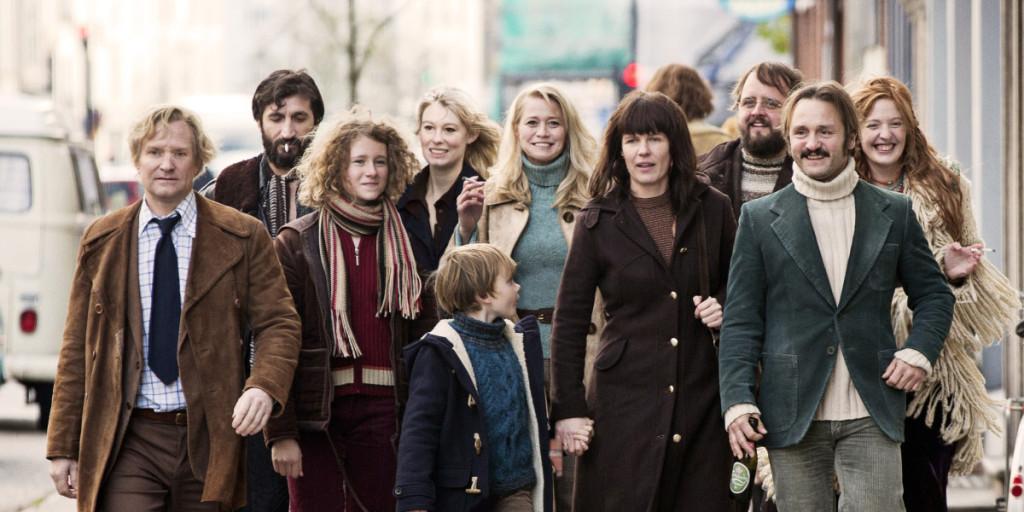
★★★☆☆
Danish Director Thomas Vinterberg’s 2016 film “The Commune,” based loosely on his childhood growing up in a Copenhagen living experiment, takes a fascinating look at the complex tangle of love and loss that occurs when many people live under one roof. The film, which originally premiered at the 2016 Toronto Film Festival, was recently released in select theaters.
Set in the 1970s in an upscale Copenhagen neighborhood, the story begins when Erik, a professor played by Ulrich Thomsen, converts his childhood home into a commune at the insistence of his wife, Anna, a newscaster played by Trine Dyrholm. The living situation initially seems energizing and fun but soon takes a turn for the worse: Erik begins an amorous affair with one of his students, and the commune must bear witness to the subsequent disintegration of Anna’s mental state, as well as its effects on her personal and professional life.
“The Commune” is a film set up for success. First, it is rooted in a fascinating concept, exploring the mingling of offbeat personalities and the circumstances that arise when, as the film’s tagline reads, “you choose your family.” The commune’s new residents are introduced in charming interviews, and there is a wonderfully funny scene in which they celebrate moving into the house by going skinny-dipping as a group. These more humorous scenes, in particular, highlight the film’s clever script and chemistry between cast members.
Although “The Commune” opens on a lighter note, viewers see potential for conflict early on in the film: Erik begins to lose Anna’s attention as her focus shifts to the new people in the house and, not long after, compensates by starting an affair with a beautiful architecture student, Emma, played by Helene Reingaard Neumann.
Erik’s decision to begin a relationship with Emma is the central point of conflict in “The Commune,” ultimately spurring a series of events that defy audience expectations and establish the film’s brilliance and originality. However, although it is interesting to watch the ripple effect of his affair, this storyline detracts from the main focus of the film: the community within the house. By making Erik’s affair — which occurs outside the walls of the house, not within it — the primary conflict, the film fails to more fully develop characters within the commune itself, whose compelling backstories merit greater exploration and depth. Although Erik, Anna and their daughter, Freja, have emotional character arcs, the other members of the commune are unaffected by Erik’s affair — and, as a result, not fully incorporated into the central plot. Thus, although the film gives viewers a glimpse into communal living with scenes of the residents meeting and creating house rules, it ultimately only shows the effects of this lifestyle choice on Erik, Anna and Freja.
Another shortcoming is the way in which the film employs light and sound. Opening scenes of “The Commune” seem to read like a horror film: The music is sinister, the transition shots of the house are eerie, and the sense of joy at the beginning of the film is highly amplified and exaggerated, as if to foreshadow impending catastrophe. Particularly since the distress in the film is more emotional than physical, the way in which the sound and shadowy camerawork primes the viewer for thrill is misleading and needlessly unnerving.
Arguably the best part of this film is Dyrholm, who brilliantly portrays Anna, a powerful and resilient businesswoman, as she frustratingly succumbs to her emotions. Dyrholm is admirably expressive when depicting Anna’s breakdown, and viewers can easily empathize with the pain and tension she feels — the weight of her grief is palpable onscreen.
Although Dyrholm’s performance is the gem of “The Commune,” the other actors were extremely well-cast. Martha Sofie Wallstrøm Hansen, who plays Freja, for example, is exceptional. Freja is quiet and observant for most of the film, knowing more than she should, and Hansen represents Freja’s silent anguish at her parents’ crumbling marriage with a sense of authentic emotion.
Overall, “The Commune” is compelling and moving to watch. The concept is unique, the characters are engaging and well-cast, and the sequence of events is riveting in its lack of predictability. Where the film suffers is in its lack of development of more characters in the commune — the new residents of the house are delightfully offbeat and interesting, and the film would do well to explore their stories in greater depth. Although viewers may leave theaters wishing they had seen more development of the commune itself, Vinterberg’s “The Commune” presents an interesting take on topic not often explored in film.



















